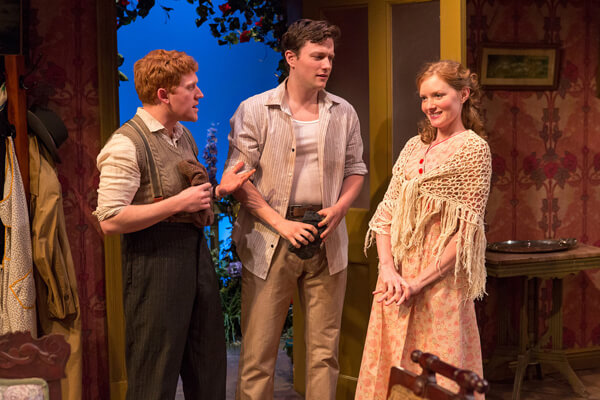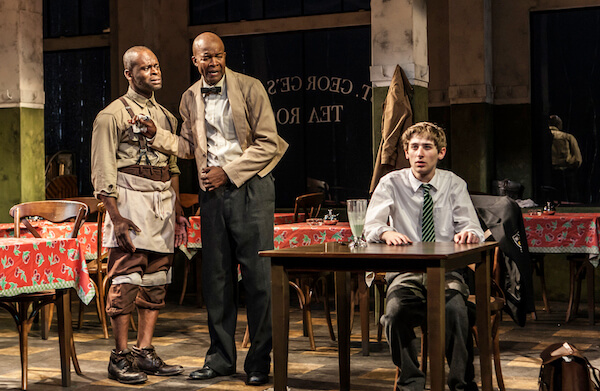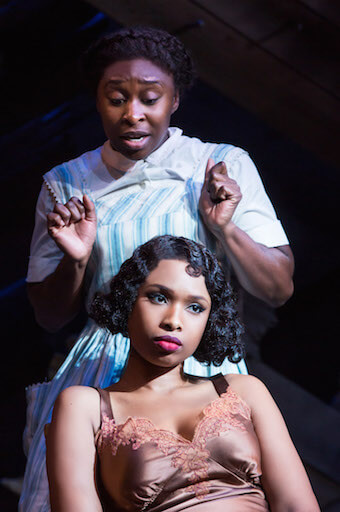Melissa Errico and Ryan Silverman in “Passion.” | JOAN MARCUS
The intimacy of the theater at CSC is a surprising and powerful setting for the outsized emotions of Stephen Sondheim’s “Passion,” now getting a glorious staging under the direction of John Doyle. Performed on a largely bare stage, Doyle’s focus is the interaction between the characters and the various forms that love and passion take — delusion, obsession, selfishness, and, if one is very lucky, a transcendent spiritual experience.
Giorgio and Clara are young, beautiful, and in love. We know this because they talk in pet names and have wild sex. Their love flatters the images they have of themselves. When Giorgio, a solider, is called to the front, he leaves Clara behind but writes her passionate letters. At the encampment, he encounters the homely, sickly Fosca, the colonel’s cousin, who becomes obsessed with him. Giorgio tries to let her down easily, but it seems his attentions are what keep her alive. Struggling with the demands on him as a gentleman, Giorgio is pulled between the obsessive, manipulative Fosca and his commitment to Clara. Tortured in the best tradition of the 19th century romantics, in the end he learns the power of “love without reason.”
In lesser hands, this could be a saccharine mess, but Doyle maintains the integrity of the story and, more importantly, the tension between the characters. The artistry and emotional honesty he brings to the show make for a profoundly moving experience that challenges our own perceptions of love.
Love is complicated in two wonderful shows at CSC, the Mint
Both intimate and grand, Doyle’s concept is fully realized by his three leading actors. Melissa Errico as Clara is sublime. She looks magnificent and her voice has never sounded better. Clara, who takes Giorgio as her lover though she is married with a child, could come across as vain, even silly, but Errico imbues her with a realism that grounds her, making the release she finds with Giorgio that much more thrilling.
Judy Kuhn as Fosca is equally extraordinary. The plainness of her costumes and the pallor of her skin are offset by the fire that burns inside her and the love for Giorgio over which she is powerless. In true operatic tradition, Kuhn plays a terminally ill patient with the pipes and the lungpower to sing Sondheim’s complex songs with ease and brilliance. Her performance is masterful, and as we grow to understand and empathize with her, she becomes beautiful to us as well. (Never pretty, but as Sondheim writes in “Sunday in the Park with George,” “Pretty isn’t beautiful. Pretty is what changes. What the eye arranges is what is beautiful.”)
Speaking of beauty, the handsome Ryan Silverman as Giorgio is much more than a matinee idol. He has a stunning and remarkably mature voice, but what makes his a breakout performance are the subtlety and subtext of his acting. As Silverman’s Giorgio grows into his love for Fosca, his entire manner and bearing change as the revelations he never anticipated and certainly never looked for transform his understanding and his heart.
Stephen Bogardus, Jeffry Denman, Tom Nelis, and Will Reynolds, in supporting roles, are strong and add to the world of the show — as well as its musicality. Under Rob Berman’s musical direction and using Jonathan Tunick’s pared-down orchestrations, the score is rich, moving, and perfectly scaled for the space — as is everything in this must-see production.
David Friedlander, Jon Fletcher, and Wrenn Smith in “Katie Roche.” | RICHARD TERMINE
Katie Roche, the title character of Teresa Deevy’s 1936 play now at the Mint, has not had an easy life. The child of an affair, she has struggled for an identity and a name in the small Irish town where she’s spent her life. Finding a respectable safe haven as a servant in the home of Amelia and her brother Stanislaus, she strives to be good, wild though she might be. When Stanislaus proposes marriage and Katie accepts, her internal turmoil turns her world upside down. This is a small play that examines how a constricted world hobbles a young woman’s spirit.
Under the direction of Jonathan Banks, we see Deevy’s characters as loving, good-hearted people stymied by their own limitations, something that makes them both believable and appealing. The underlying mood, however, is not bleak.
Wrenn Smith does a fine job as Katie, and we feel for her predicaments. Margaret Daly is adorable as Amelia, who becomes a loving sister and friend to Katie. Patrick Fitzgerald is also very good as Stanislaus, a man who struggles with his love for Katie and his desire for an ordered life — something that Katie, by her very nature, upsets.
Other notable performances come from Jon Fletcher as Michael, the young man Katie was attracted to who makes Stanislaus jealous, John O’Creagh as Amelia’s surprise suitor, and David Friedlander as Michael’s friend Jo.
As a protest against the attitudes about women in the 1930s, the play has a deft touch and never becomes preachy or aggressive. This is an engaging play, and with the Mint’s production — its third Deevy outing — it has a compelling new life.
PASSION | Classic Stage Company; 136 E. 13th Street | Through Apr. 14 ; Tue.-Wed. at 7 p.m.; Thu.-Sat at 8 p.m.; Wed., Sat.-Sun. at 3 p.m. | $60-$80 at ovationtix.com or 212-353-3101
KATIE ROCHE | The Mint Theater | 311 W. 43rd St. | Through Mar. 31; Tue.-Thu. at 7 p.m. : Wed., Sat. at 8 p.m.; Sat.-Sun. at 2 p.m. | $55; at ovationtix.com or 866-81-4111




































